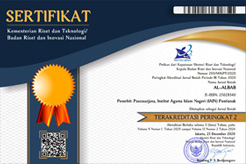Hamka, Social Criticism and The Practices of Polygamy in Minangkabau
Abstract
Keywords
Full Text:
PDFReferences
Amin, A. (2019). From Mushalla to Mosque: The Formation of South and Southeast Asian Muslim Communities in Japan. Al-Albab, 8(1), 3 - 20. doi:https://doi.org/10.24260/alalbab.v8i1.1050
Anggun, G. (2017). Matriarkhat, Poligami, Malakok. In Padang Today, www.padang-today.com 6 Mei 2017. Accessed on 8 Agustus 2019.
Arya, M. (2017). Poligami di Sumatera Barat Tahun 1925, Tertinggi Di Masanya, in Padangkita, http://padangkita.com/poligami-di-sumatera-barat- tahun-1925-tertinggi-dimasanya/. Monday 09/10/17. Accessed on 12 Agustus 2018.
--------. (2018). Mendukung Gerakan Poligami dari Ranah Minang, in Padangkita, http://padangkita.com/mendukung-gerakan-poligami-dari-ranah-minang/. Saturday 24/02/18. Accessed on 6 September 2018.
Azizah, N. (2015). Pemikiran Hamka tentang Poligami dalam Tafsir Al- Azhar, in Yurisprudentia, Vol. 1, No. 1, IAIN Padangsidempuan, Juni 2015, p. 100-110.
Chatra, E. (2005). Orang Jemputan: Regulasi Seksualitas dan Poligami di Minangkabau. Unpublished Thesis. Padang: Fakultas Ilmu Sosial dan Ilmu Politik Universitas Andalas.
Dawud, A. (1990). Sunan Abi Dawud, Jilid I. Beirut: Dar al-Fikr.
Gusmian, I. (2003). Khazanah Tafsir Indonesia: Dari Hermenuetika hingga Ideologi. Jakarta: Teraju.
Hamersma, H. (1983). Tokoh-Tokoh Filsafat Barat Modern. Jakarta: Gramedia.
Hamka, I. (2017). Ayah. Jakarta: Republika.
Hamka. (1979). Kenang-Kenangan Hidup. Jakarta: Bulan Bintang.
--------. (1982). Ayahku. Jakarta: Umminda.
--------. (2015). Tafsir Al-Azhar (Diperkaya dengan Pendekatan Sejarah, Sosiologi, Tasawuf, Ilmu Kalam, Sastra, dan Psikologi), Jilid 2 Juz 4,5,6. Jakarta: Gema Insani.
Hanafi, H. (1989). al-Din wa al-Tsawrah fi Mishr 1952-1981: al-Yamin wa al-Yasar fi-fikr al-Diniy, Vol. 7. Kairo: Maktabah Madbuli.
Harahap, P. (1926). Dari Pantai ke Pantai: Perdjalanan ke-Soematra, October-Dec. 1925 dan Maart-April 1926, in Bintang Hindia. Leidin: Leiden University, 1926), p. 86-87.
Karni, A.S. (2003). Adat Bersendi Poligami, in Gatra, http://arsip.gatra.com/2003-04-24/majalah/artikel.php?pil=23&id=27819. Accessed on 19 Juli 2018.
Keimmy, X. K. (2018). Polygamy is Still Tolerated in Indonesia, Advocates and Activists Speak Out, in Indonesiaexpat, http://indonesiaexpat.biz/featured/indonesia-marriage-law-polygamy/, Accessed on 24 September 2018.
Mahfudz, M. (2013). Fi Dzilal al-Qur’an: Tafsir Gerakan Sayyid Quthub, in Jurnal Tafsere, Vo. 1 No. 1 (2013), p. 117-134.
Muradi. (2007). Al-Amr bi al-Ma’ruf wa al-Nahy ‘an al-Munkar: Dirasah fi Ara’i al-‘Alim HAMKA fi Tafsir al-Azhar, in Studia Islamika Indonesian Journal for Islamic Studies, Vol. 14, Number 2, 2007, p. 311-339.
Muslih, M. (2008). Filsafat Ilmu. Yogyakarta: Belukar.
Nuryatno, M. A. (2007). Examining Ali Asghar Engineer's Quranic Interpretation of Women in Islam, in Al-Jami'ah, Vol. 45, No. 2, 2007, p. 389-414. DOI: 10.14421/ajis.2007.452.389-414.
Poespasari, E. D. (2018). Pemahaman Seputar Hukum Waris Adat Di Indonesia. Jakarta: Kencana.
Qudsy, S., Abdullah, I., & Qodir, Z. (2017). The Symbolic Power of Sleeping without Mattress Practice in Kasuran Village of Yogyakarta. Al-Albab, 6(2), 281 - 300. doi:https://doi.org/10.24260/alalbab.v6i2.726
Ranuwijaya, U. (1998). Hadis-hadis Kitab Tafsir Al-Azhar Hamka: Analisis Sanad Hadis pada Ayat-ayat Hukum Bidang Perkawinan”, in Unpublished Thesis. Jakarta: Program Pascasarjana IAIN Syarif Hidayatullah.
Ridwan, M.K. (2017). Tradisi Kritik Tafsir: Diskursus Kritisisme Penafsiran dalam Wacana Qur’anic Studies, in Jurnal Theologia Vol. 28 No. 1, DOI: http://dx.doi.org/10.21580/teo.2017.28.1.1418. 55-74.
Rush, J. R. (2016). Hamka’s Great Story: A Master Writer’s Vision of Islam for Modern Indonesia. Wisconsin: The University of Wisconsin Press.
Saenong, I. B. (2002). Hermeneutika Pembebasan, Metodologi Tafsir Al Qur’an menurut Hassan Hanafi. Jakarta: Teraju.
Sirry, M. (2014). Sciptural Polemics; The Qur’an and Other Religion. New York: Oxford University Press.
Soekanto, S. (1986). Pengantar Penelitian Hukum. Jakarta: Universitas Indonesia.
Sudrajat, A. S. A. (2016). Syekh Nawawi al-Bantani, Buya Hamka dan Quraish Shihab: Pandangan Hukum tentang Poligami dan Latar Belakangnya,” in Unpublished Skripsi, Malang: Fakultas Syariah Jurusan al-Ahwal asy- Syakhsiyah UIN Malang.
Syarif, S. (2019). Spiritual Education Mission in the Mufassirin Perspective. Al-Albab, 8(2), 237 - 262. doi:https://doi.org/10.24260/alalbab.v8i2.1444
Yusuf, M. (2005). Hamka’s Method in Interpreting Legal Verses of the Qur’an, in Abdullah Saeed (ed.), Approaches to the Qur’an in Contemporary Indonesia. London: Oxford University Press.
Article Metrics
 Abstract views: 2594
Abstract views: 2594
 PDF views: 1297
PDF views: 1297











